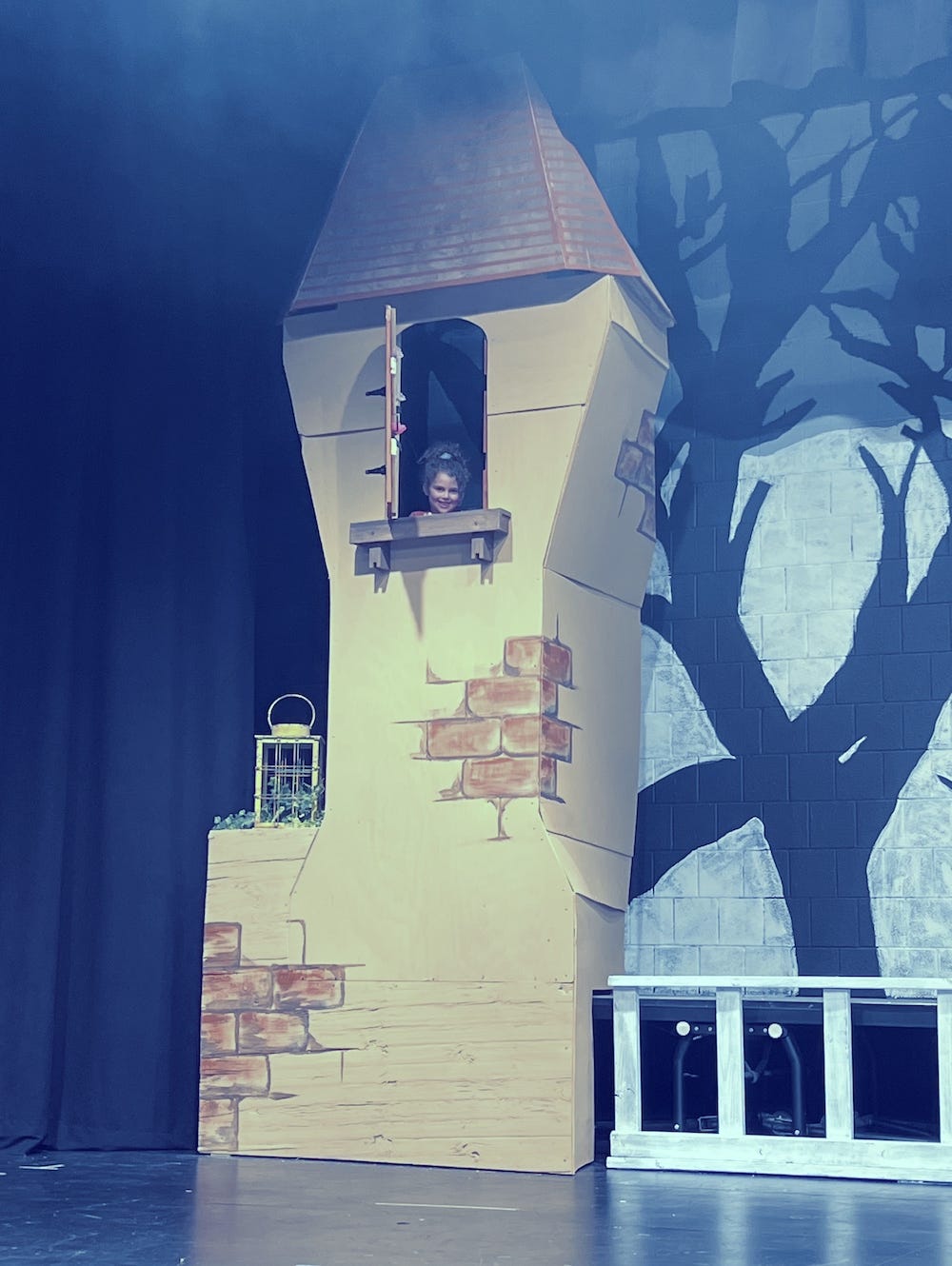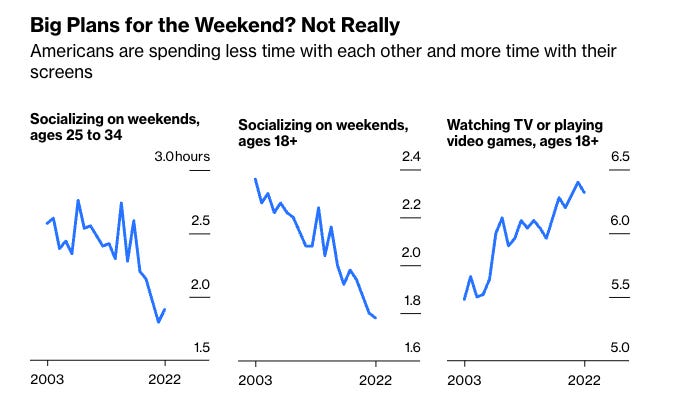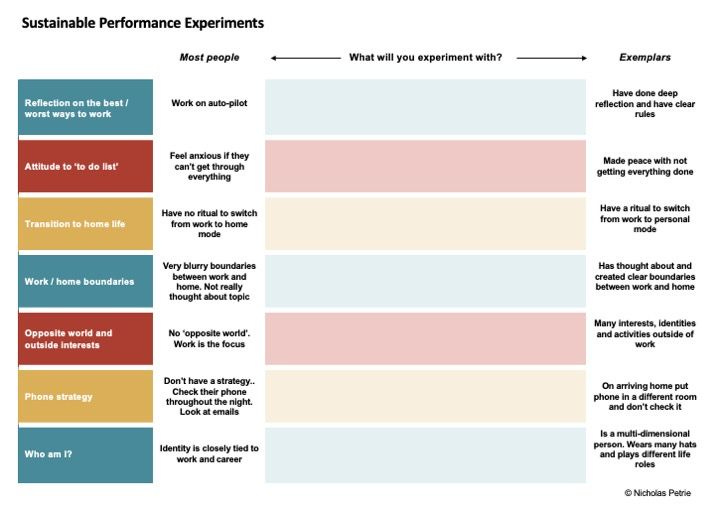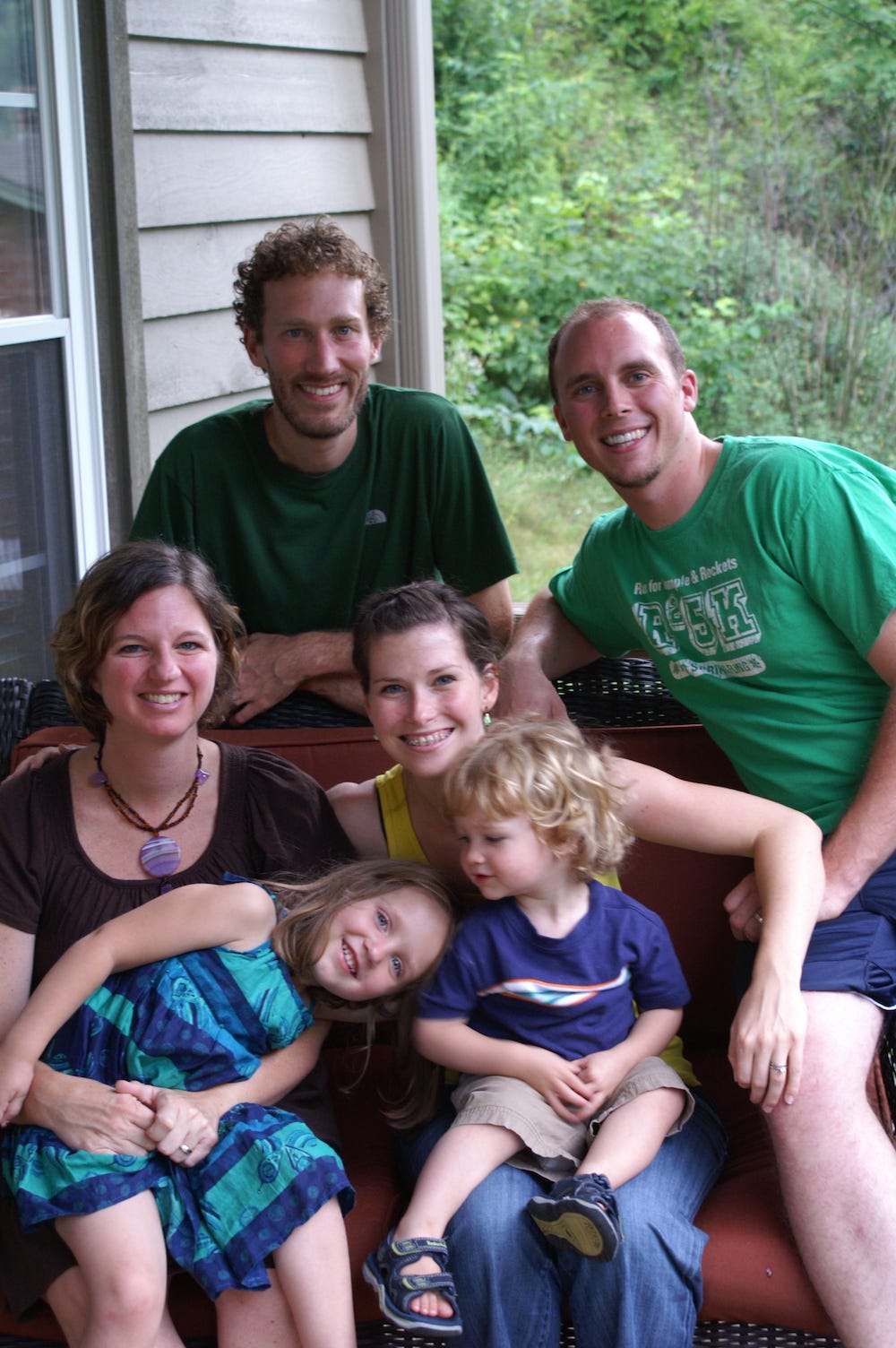🌊 The Plunge #6: Playing Solitaire: Loneliness, Remote Work, and the Community Deficit
But in happy news, UNICORNS! A THROWBACK PHOTO! BIRTHDAYS!
If you’re enjoying The Diving Board, will you consider sharing it with a friend or colleague? Perhaps someone who digs personal and professional development, needs an additional email in their lonely inbox, or just generally has good taste? 😉 You can either forward this post and invite them to subscribe if they like what they read, or click the button below. I’m about 50 readers away from hitting my next big milestone of 500 subscribers! Wanna help?
As I write this essay, I’m sitting on my living room couch, white noise pulsing through my earbuds to help me focus on writing as my husband and daughter snuggle up nearby watching Matilda the Musical on Netflix for the 37th time. I see their mouths moving as they laugh or sing along, but I can’t hear their voices. I’m suspended in a soundproof bubble. We’re together, yes, but I’m really in my own little world.
This seems to parallel the way many of us are living and working…together, but alone. Alone, but together.
I’m convinced it’s not working out so well.
(It is, however, helping me write this essay, so I’ll abide it a touch longer.)
Remotely American
I’ve been closely following headlines lately describing the loneliness epidemic as well as the remote work vs. return-to-office (RTO) debate. And of course, I’m subjected to the glut of “good guys vs. bad guys” clickbait revving us up for the 2024 election cycle. In all these headlines, the common thread I see is a dysfunction in our “togetherness”. How and when should we be together? And do we even want to be?
If you’ve ever seen Hofstede’s 6 Dimensions of Culture (side note: this Country Comparison Tool is amazing), you know that America is highly Individualistic, while other cultures, such as Guatemala or Thailand are more Collectivist (community-first). Neither is better or worse, but either in extreme form comes with trade-offs.
In America we’ve embraced individualism like Narcissus would a full-length mirror, exclaiming “Who the hell needs community?! Community is for sissies.” (FYI, our need for community is still in there. It’s just repressed, until it eventually bursts out sideways as destructive tribalism - see above point about Election 2024.)
In his book The Second Mountain, David Brooks says of modern American culture:
“Our society suffers from a crisis of connection, a crisis of solidarity…. There is always a tension between self and society, between the individual and the group. Over the past sixty years we have swung too far toward the self. The only way out is to rebalance, to build a culture that steers people toward relation, community, and commitment – the things we most deeply yearn for, yet undermine with our hyper-individualistic way of life.”
In other words, in the decades leading up to 2020, we were already on a high-speed train to Isolation Station. Then came a pandemic and the resulting need for social distance, followed by the cherry on top: indefinite remote work.
For all the gifts of remote work, it doesn’t happen in a vacuum (that would suck). No, remote work happens on the high-speed loneliness train, and I’m a little worried that it’s increasing both the speed of the train and our risk of derailment.
As we wrestle with the options – RTO? Fully remote? Hybrid? – I’m not saying the loneliness factor should be the most important consideration, or that RTO is the answer. (I’ll be the first to admit that if I’d been given the nicely wrapped gift *Remote Work /To: Claire / Love: Your Company * then asked to fork it back over, I would not be happy.) But I am saying loneliness should at least be one consideration shaping the RTO vs. Remote Work conversation.
That’s what this essay is about.

Loneliness By the Numbers
Just ask Elmo: Americans are not ok.
The nation’s suicide rate increased 48% in the years spanning 1999-20201, and depression rates have soared to all-time highs2. Author Johann Hari investigated these trends and ultimately wrote the book Lost Connections, which reveals the undeniable link between increasing isolation and widespread depression. “...Loneliness isn’t just some inevitable human sadness, like death.” Hari writes. “It’s a product of the way we live now."
What’s contributing to the isolation? (In case you need a hint, you’re looking at one right now.) You guessed it - screens. Readers, the graphs below absolutely scared the socks off me and made me want to put my iPhone into the blender on high speed and schedule a neighborhood potluck, stat.

Should Work Be Your Community?
Some of you may be thinking, “Ok, yup, we’re lonely. But spending more time at work is not the answer. What we need is more connection in our personal lives”. (I don’t disagree! That, too!) Others of you may shrink in horror at the idea of making close friends at work or equating work to “community”.
A strong line between WORK and LIFE is a reasonable approach for many. My bias, though, is that given that we’ll spend roughly 90,000 hours of our lives at work, a lil’ dose of friendship in the mix will give us a much stronger ROI on those hours.
Just the presence of other humans – the sights and sounds of interpersonal activity – goes a long way in helping us feel less alone. My former co-worker Eva messaged me recently about this.
“When I started working remote full-time in 2017 it took me a good 6 months to realize what was missing…laughter in the workplace, which is hard to get right on screens and chats. I built up my network of coffee dates, remote working buddies to meetup with, and local social connections with a purpose-humor/laughter/learning. Those fell away during the pandemic and building back the routines is proving difficult.”
- Eva, my former office-mate, smart person, current remote worker
As Derek Thompson says in his poignant Atlantic article Why Americans Suddenly Stopped Hanging Out, our social infrastructure has been eroding for decades: declining rates of community group involvement and church attendance, far less time spent with friends, and now the disintegration of office life. The more these social structures fall away, the more we are left to our own devices (pun intended) to cobble together a sense of community. And let’s be honest, what my friend Eva described can be a real logistical nightmare. When faced with the prospect of wrangling a dozen Google calendars to string together a series of standalone social meet-ups…it’s often easier just to stay home.
So no, work doesn’t have to be your community. But Thompson defines community as “where people keep showing up”, and for so many of us, work is (was?) one of the only places we frequent nowadays where the same people keep on showing up. Remote work, for all its benefits, also represents another closed avenue to social connection.
The Ambivalence
At the heart of the loneliness epidemic, and at the heart of the remote work debate, is an ambivalence. We’re torn between seemingly competing priorities. Should we choose our individual agenda or our desire for connection? Solitary efficiency or collective possibilities? Autonomy or community?
I see this ambivalence play out in my own life all the time.
Communal Me: Sigh. I miss college, when I had 20 friends living down the dorm hall or right above my head (except for that chick Samantha, my upstairs neighbor whose click-clocking high heels formed the soundtrack of my entire sophomore year. I do not miss Samantha.) In my early 20s, my husband and I lived with another family for a while, the Gersondes. We loved on their kids, made meals together, and stayed up late talking on the front porch after the munchkins went to bed. I long for that sort of closeness now, for more contact with friends and neighbors, for more socializing in the flow of life without it having to be so damn over-scheduled. And while I love being self-employed and working from home, I do profoundly miss my dream team from my corporate days.
Invidualistic Me: I sometimes evade eye contact with friendly neighbors, hoping to avoid getting pulled into conversation. I need to “preserve my energy”. These days, I can’t imagine living with anyone else besides my immediate family because my home is my sanctuary. (In fact, I fantasize about not even living with my immediate family – love y’all, I’ll be in my yurt.) Truth be told, I am a raging introvert - if I don’t get my alone time, I might literally rage. During the workday, I decline to attend optional “Community Meet-Ups” with other coaches - the closest thing I have to co-workers – because, you know, those meetings are nice but I always seem to have a more pressing priority when they pop up on my calendar.
Brooks paints a picture of “rich community” in The Second Mountain, and it both exhausts me and fills me with longing.
“In a rich community, people are up in one another’s business, know each other’s secrets, walk with each other in times of grief, and celebrate together in times of joy. In a rich community, people help raise one another’s kids. In these kinds of communities, which were typical in all human history until the last sixty years or so, people extended to neighbors the sorts of devotion that today we extend only to family.”
– David Brooks
I want this. But I would hate this! Wouldn’t I? Sure, I’ll take help raising my kids, but I don’t have the energy to raise yours, too, and I sure don’t want you up in my business. Until I’m lonely or overwhelmed or grieving, and then I need you in my business so I don’t feel so devastatingly alone. Bring me a casserole, but more importantly, bring me your presence and your open heart, and stay, please stay.
So What’s a Loner to Do?
I would be oversimplifying things if I implied that the answer to this ambivalence was simply for you and me to get our priorities straight. Or for CHRO’s everywhere to declare, “RETURN TO OFFICE. SAVE YOURSELF FROM THE LONELIEST FATE!”.
The loneliness epidemic and the “where to work” conundrum are not individual issues. They’re not even organizational issues. They are complex, systemic issues, inextricably bound up with society at large.
Systemic issues are tangled webs. Pulling a thread in one part of the web may set off a chain reaction in other parts of the web. Cause and effect is not so clear, and nothing happens in isolation. These kinds of issues are exceedingly hard to “solve”.
For instance, Return to Office might solve a piece of the loneliness problem for some of us. But it also may increase stress by adding commute time, decrease time spent with family, add more car exhaust fumes to the atmosphere, and increase the risk of spreading everything from COVID to the common cold. These are tradeoffs worth contemplating.
When we talk about remote work vs. hybrid vs. RTO, we’re talking about business outcomes, work culture, quality of collaboration, yes. But what I hope you will take from this essay is that we’re also talking about so much more: loneliness, work-life balance, the environment, public health. Every individual and every organization will have to weigh all these things in the balance, to see the whole tangled web and settle for the least imperfect next move, because no perfect one exists.
And anyway, rather than looking for The (Imaginary) Solution, we can best address systemic issues by asking better questions and experimentally nudging the system3. So, here is A Question about A Nudge:
In your spheres of influence, what incremental nudge might foster community and connection while also honoring the other elements of the tangled web?
What’s one thing? Just try that one thing, see how it goes, then try it again, or try something else. But be a nudger.
“To Be Happy is To Be Tied”
Here's what I do know, beyond a shadow of a doubt: most of us desperately need more human contact in our lives. Yes, this will cost us something. But the status quo – living and working alone but together – is also costing us dearly. As C.S. Lewis said, “The price of freedom is loneliness. To be happy is to be tied.”
So what – and who – do you want to be tied to? And what freedoms and efficiencies are you willing to give up for what a more-connected-you will gain?
I’d love to hear your reflections in the comments.
🌅 In the last edition of The Plunge, I promised to follow up about my 7-Morning Challenge to start my days with a breathwork practice. And the follow-up is – you guys, mornings are hard. I made it happen a handful of days but overall did a pretty abysmal job of meeting the challenge. Y’all were supposed to be my accountability partners, though, and I did not get a single 5 AM text message goading me to GET UP AND BREATHE…so can I partly blame you for my underwhelming follow-through? No? Ok. Onward.
Nick Petrie’s latest research on 🔥 Burnout🔥 is hands-down the best work I’ve seen on this topic. I especially liked this recent LinkedIn post on the 8 Habits of people who don’t burn out. Pick a habit and experiment with it!

After I used a “smiling pile of poo” emoji in last week’s newsletter, someone shared this gem with me. It lifts the spirits, does it not?

🦄 True or False: The word “unicorn” can be found in the Bible.
Answer: True. I just found this out! What?! How did I not know this? I grew up memorizing more Bible verses than all of you combined* (and in the King James Version no less – which is the translation in which the word unicorn appears), so I’m really baffled I missed this.
*Think I’m exaggerating? My childhood denomination (which was a touch fringy) recruited us youngsters into “Bible Quizzing”, which made mainstream Christian Sword Drills and Awana nights look like child’s play. At 8 years old, for instance, I memorized the entire book of Romans and traveled to tournaments across the state and country, hitting buzzers and answering quiz questions (AND WINNING)! Not saying this was healthy. Just saying it happened.
One of the gifts of this newsletter has been reconnecting with some friends I’ve been out of touch with for a while. Joyfully, this includes Kerry and Aaron Gersonde – the family Rob and I lived with in our 20’s while living in Boone, NC. You know, back when I was less lonely. ;) Here’s a throwback photo from the good old days:

We haven’t been back to visit Boone since we moved away in 2010, and I’m hoping to change that before too long. We spent the first 3 years of our marriage there, in the heart of the idyllic Appalachian Mountains. Mountain hikes. Deep friendships. Newlywed fights. Actual free time before we had kids…
🎂 Speaking of which, we’re gearing up for my daughter Mabel’s 7th birthday on Saturday! She doesn’t know it yet, but we are surprising her with something she’s been begging for this entire last year. Any guesses? Hint #1: It’s a girlhood rite of passage. (It’s not her first boyfriend. She already scored that.) Hint #2: It involves both an experience and material goods. I’ll share a pic in my next newsletter revealing the surprise gift, after we recover from the very raucous party we’re planning.
Like tuna salad in a flour tortilla, that’s a wrap.
Now, get back in there.
https://www.psychiatrist.com/news/suicide-mortality-spiked-48-in-20-years-new-cdc-data-shows/#:~:text=From%201999%2D2020%2C%20the%20age,was%20among%20Asian%2FPacific%20Islanders.
https://news.gallup.com/poll/505745/depression-rates-reach-new-highs.aspx
https://www.linkedin.com/pulse/leading-complexity-four-lessons-from-field-jennifer-garvey-berger/








I resonate with so much of this especially the tension between a deep desire for rich community and a craving for solo time. You might enjoy a recent episode of the Ezra Klein Show called "What Relationships Would You Want, If You Believed They Were Possible?" He talks about many of the threads you named here.
The piece in The Atlantic was quite sobering, and also spot-on. I don’t have kids, and my two closest friends here in Denver don’t have kids. And yet finding time for the three of us to get together sometimes feels harder than it’s worth. It feels as if we (the global we, not just the three of us) have two simultaneous epidemics of loneliness and business. That being said, with each of these friends we are leaning into the impromptu, and it’s lovely. Example: when my flight was delayed two hours on Saturday, I left my home as planned and met my friend for dinner. Being a solopreneur can feel exceptionally isolating, and I appreciate and embrace opportunities for community with clients and peers. Like you. 😊